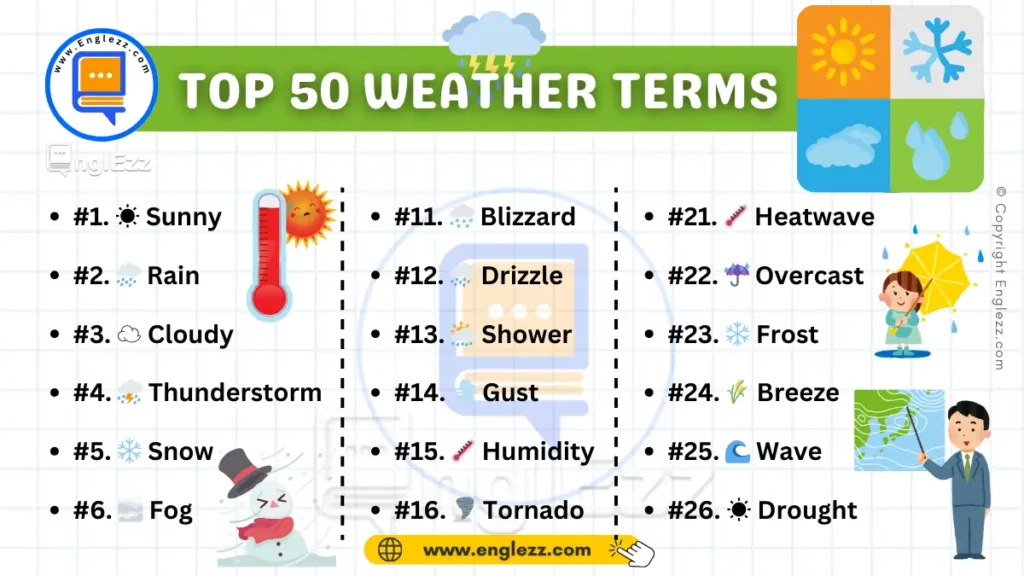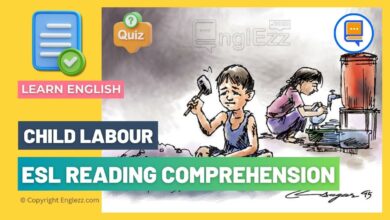Weather is a topic that touches everyone’s life daily, making it an essential part of everyday conversation. Understanding weather-related vocabulary not only helps in daily interactions but also in interpreting weather reports, planning activities, and staying safe during extreme conditions. In this blog post, we’ll dive into the 50 most common weather English terms, breaking them down with easy-to-understand definitions, phonetic transcriptions, and practical examples.
Table of Contents
- 50 Weather English Terms Every Student Must Know
- #1. ☀️ Sunny [ˈsʌni]
- #2. 🌧️ Rain [reɪn]
- #3. ☁️ Cloudy [ˈklaʊdi]
- #4. ⛈️ Thunderstorm [ˈθʌndərˌstɔrm]
- #5. ❄️ Snow [snoʊ]
- #6. 🌫️ Fog [fɔg]
- #7. 🌬️ Windy [ˈwɪndi]
- #8. 🌩️ Lightning [ˈlaɪtnɪŋ]
- #9. 🌪️ Tornado [tɔrˈneɪdoʊ]
- #10. 🌈 Rainbow [ˈreɪnˌboʊ]
- #11. 🌡️ Temperature [ˈtɛmprətʃər]
- #12. 🌨️ Blizzard [ˈblɪzərd]
- #13. 🌧️ Drizzle [ˈdrɪzəl]
- #14. 🌦️ Shower [ˈʃaʊər]
- #15. 💨 Gust [gʌst]
- #16. 🌾 Breeze [briːz]
- #17. 🌊 Wave [weɪv]
- #18. 🌡️ Humidity [hjuˈmɪdɪti]
- #19. 🌧️ Downpour [ˈdaʊnˌpɔr]
- #20. 🌩️ Hail [heɪl]
- #21. 🌡️ Heatwave [ˈhiːtˌweɪv]
- #22. ☔ Overcast [ˈoʊvərˌkæst]
- #23. ❄️ Frost [frɔst]
- #24. 🌦️ Mist [mɪst]
- #25. 🌧️ Monsoon [mɑnˈsun]
- #26. ☀️ Drought [draʊt]
- #27. 🌪️ Hurricane [ˈhɜrɪˌkeɪn]
- #28. 🌬️ Cyclone [ˈsaɪkloʊn]
- #29. 🌪️ Typhoon [taɪˈfun]
- #30. ❄️ Ice Storm [aɪs stɔrm]
- #31. 🌡️ Dew [du]
- #32. 🌧️ Sleet [slit]
- #33. 🌞 Radiant [ˈreɪdiənt]
- #34. 🌧️ Torrential [təˈrɛnʃəl]
- #35. 🌡️ Barometer [bəˈrɒmɪtə]
- #36. 🌪️ Vortex [ˈvɔrˌtɛks]
- #37. 🌧️ Weather Front [ˈwɛðər frʌnt]
- #38. 🌨️ Flurry [ˈflɜri]
- #39. 🌬️ Gale [ɡeɪl]
- #40. 🌧️ Shower [ˈʃaʊər]
- #41. 🌨️ Frostbite [ˈfrɔstˌbaɪt]
- #42. 🌦️ Sunbeam [ˈsʌnˌbiːm]
- #43. 🌧️ Precipitation [ˌprɛsɪpɪˈteɪʃən]
- #44. 🌈 Spectrum [ˈspɛktrəm]
- #45. 🌫️ Low Pressure [loʊ ˈprɛʃər]
- #46. 🌤️ High Pressure [haɪ ˈprɛʃər]
- #47. 🌬️ Updraft [ˈʌpdræft]
- #48. 🌩️ Downburst [ˈdaʊnbɜrst]
- #49. 🌪️ Jet Stream [dʒɛt striːm]
- #50. 🌥️ Partly Cloudy [ˈpɑːrtli ˈklaʊdi]
- Weather English Terms Table
- Conclusion
50 Weather English Terms Every Student Must Know
Whether you’re a language learner looking to expand your vocabulary or just someone interested in the weather, this guide is designed to make you weather-savvy. Let’s explore the language of the skies, winds, and atmospheric phenomena that influence our world every day. 🌦️
#1. ☀️ Sunny [ˈsʌni]
Definition: Clear sky with lots of sunshine.
Examples:
- “It’s a sunny day; perfect for a picnic.”
- “The forecast predicts a sunny weekend.”
#2. 🌧️ Rain [reɪn]
Definition: Water droplets falling from clouds.
Examples:
- “The rain ruined our outdoor plans.”
- “Heavy rain is expected this evening.”
#3. ☁️ Cloudy [ˈklaʊdi]
Definition: Covered with clouds.
Examples:
- “It’s a cloudy morning, but the sun might come out later.”
- “The sky is so cloudy today.”
#4. ⛈️ Thunderstorm [ˈθʌndərˌstɔrm]
Definition: A storm with thunder, lightning, and heavy rain.
Examples:
- “The thunderstorm last night was intense.”
- “We need to stay indoors; a thunderstorm is approaching.”
#5. ❄️ Snow [snoʊ]
Definition: Frozen water vapor falling in light white flakes.
Examples:
- “It’s snowing heavily; let’s build a snowman!”
- “The snow covered the roads overnight.”
#6. 🌫️ Fog [fɔg]
Definition: A thick cloud of tiny water droplets near the ground.
Examples:
- “The fog is so dense I can hardly see.”
- “Driving in the fog can be dangerous.”

#7. 🌬️ Windy [ˈwɪndi]
Definition: Strong winds blowing.
Examples:
- “It’s too windy to fly a kite today.”
- “The windy conditions might delay the flight.”
#8. 🌩️ Lightning [ˈlaɪtnɪŋ]
Definition: A flash of light in the sky caused by electricity in the air.
Examples:
- “The lightning was followed by a loud thunderclap.”
- “Did you see that lightning strike?”
#9. 🌪️ Tornado [tɔrˈneɪdoʊ]
Definition: A rotating column of air extending from a thunderstorm to the ground.
Examples:
- “A tornado touched down in the countryside.”
- “We took shelter as the tornado approached.”
#10. 🌈 Rainbow [ˈreɪnˌboʊ]
Definition: A multicolored arc made by light refracting through water droplets.
Examples:
- “A beautiful rainbow appeared after the rain.”
- “Everyone stopped to admire the rainbow.”
#11. 🌡️ Temperature [ˈtɛmprətʃər]
Definition: A measure of how hot or cold something is.
Examples:
- “The temperature dropped below freezing last night.”
- “What’s the temperature today?”
#12. 🌨️ Blizzard [ˈblɪzərd]
Definition: A severe snowstorm with strong winds.
Examples:
- “The blizzard stranded many travelers.”
- “We’re preparing for an incoming blizzard.”
#13. 🌧️ Drizzle [ˈdrɪzəl]
Definition: Light rain falling in fine drops.
Examples:
- “It’s just a drizzle; we can still go out.”
- “The drizzle lasted all morning.”
#14. 🌦️ Shower [ˈʃaʊər]
Definition: A brief period of rain.
Examples:
- “A shower just passed; the sky is clearing up.”
- “There are chances of scattered showers today.”
#15. 💨 Gust [gʌst]
Definition: A brief, strong burst of wind.
Examples:
- “A gust of wind almost blew my hat away.”
- “The gusts are getting stronger.”
#16. 🌾 Breeze [briːz]
Definition: A gentle wind.
Examples:
- “There’s a nice breeze by the sea.”
- “A cool breeze made the evening comfortable.”
#17. 🌊 Wave [weɪv]
Definition: A moving ridge on the surface of the sea.
Examples:
- “The waves are high today; surfing will be fun!”
- “Waves crashed against the shore.”
#18. 🌡️ Humidity [hjuˈmɪdɪti]
Definition: The amount of moisture in the air.
Examples:
- “The humidity is making it feel hotter than it is.”
- “High humidity often leads to thunderstorms.”
#19. 🌧️ Downpour [ˈdaʊnˌpɔr]
Definition: A heavy and sudden rainfall.
Examples:
- “We got caught in a downpour without an umbrella.”
- “The downpour flooded the streets.”
#20. 🌩️ Hail [heɪl]
Definition: Pellets of frozen rain that fall in showers.
Examples:
- “The hail damaged many cars last night.”
- “Hail the size of golf balls fell during the storm.”
#21. 🌡️ Heatwave [ˈhiːtˌweɪv]
Definition: A prolonged period of excessively hot weather.
Examples:
- “The heatwave has everyone staying indoors.”
- “We’re experiencing the hottest heatwave of the decade.”
#22. ☔ Overcast [ˈoʊvərˌkæst]
Definition: Covered with clouds; no sunlight.
Examples:
- “The sky is overcast, but it hasn’t started raining yet.”
- “An overcast day makes everything look dull.”
#23. ❄️ Frost [frɔst]
Definition: A thin layer of ice crystals on a cold surface.
Examples:
- “The frost on the grass looked beautiful this morning.”
- “Be careful of frost on the roads.”
#24. 🌦️ Mist [mɪst]
Definition: A thin fog with condensation near the ground.
Examples:
- “The mist in the valley was enchanting.”
- “Driving through the mist felt surreal.”
#25. 🌧️ Monsoon [mɑnˈsun]
Definition: A seasonal wind bringing heavy rain.
Examples:
- “The monsoon season in India is intense.”
- “Monsoons bring much-needed rain to the region.”
#26. ☀️ Drought [draʊt]
Definition: A prolonged period of abnormally low rainfall.
Examples:
- “The drought has caused water shortages.”
- “Farmers are struggling due to the drought.”
#27. 🌪️ Hurricane [ˈhɜrɪˌkeɪn]
Definition: A large, powerful storm with strong winds and heavy rain.
Examples:
- “The hurricane is expected to make landfall tonight.”
- “Many coastal towns are preparing for the hurricane.”
#28. 🌬️ Cyclone [ˈsaɪkloʊn]
Definition: A system of winds rotating inward to an area of low pressure.
Examples:
- “The cyclone caused widespread damage.”
- Cyclones are common in the region during this time of year.
#29. 🌪️ Typhoon [taɪˈfun]
Definition: A tropical storm in the region of the Indian or western Pacific oceans.
Examples:
- “The typhoon is expected to hit Japan by Friday.”
- “Typhoons bring heavy rain and strong winds.”
#30. ❄️ Ice Storm [aɪs stɔrm]
Definition: A storm with freezing rain that leaves a coating of ice.
Examples:
- “The ice storm knocked out power to thousands of homes.”
- “Driving during an ice storm is extremely hazardous.”
#31. 🌡️ Dew [du]
Definition: Tiny drops of water that form on cool surfaces at night.
Examples:
- “Morning dew covered the grass.”
- “The flowers looked fresh with dew drops on them.”
#32. 🌧️ Sleet [slit]
Definition: A mix of rain and snow that forms ice pellets.
Examples:
- “Sleet is expected to fall overnight.”
- “The roads were slippery due to sleet.”
#33. 🌞 Radiant [ˈreɪdiənt]
Definition: Bright and shining with light.
Examples:
- “The radiant sunshine made the day feel warm.”
- “Her radiant smile was like a burst of sunshine.”
#34. 🌧️ Torrential [təˈrɛnʃəl]
Definition: Extremely heavy rainfall.
Examples:
- “Torrential rain caused the river to overflow.”
- “We had to stay indoors due to the torrential downpour.”
#35. 🌡️ Barometer [bəˈrɒmɪtə]
Definition: An instrument measuring atmospheric pressure.
Examples:
- “The barometer is falling; a storm might be coming.”
- “We use a barometer to predict changes in the weather.”
#36. 🌪️ Vortex [ˈvɔrˌtɛks]
Definition: A mass of spinning air, often forming a cyclone.
Examples:
- “The tornado created a powerful vortex.”
- “The vortex of the cyclone caused massive destruction.”
#37. 🌧️ Weather Front [ˈwɛðər frʌnt]
Definition: The boundary between two different air masses.
Examples:
- “A cold front is moving in from the north.”
- “Weather fronts often bring sudden changes in weather.”
#38. 🌨️ Flurry [ˈflɜri]
Definition: A light snowfall with little accumulation.
Examples:
- “We saw a flurry of snow this morning.”
- The weather report predicts snow flurries.
#39. 🌬️ Gale [ɡeɪl]
Definition: A strong wind, often defined as 34-40 knots.
Examples:
- “A gale warning was issued for the coastal areas.”
- “The gale-force winds knocked down trees.”
#40. 🌧️ Shower [ˈʃaʊər]
Definition: A brief and usually light rain.
Examples:
- “The forecast predicts occasional showers.”
- “A quick shower passed through, but it’s clear now.”
#41. 🌨️ Frostbite [ˈfrɔstˌbaɪt]
Definition: Injury to body tissues caused by extreme cold.
Examples:
- “Frostbite can occur if you’re exposed to cold temperatures too long.”
- “Protect your skin to avoid frostbite in extreme cold.”
#42. 🌦️ Sunbeam [ˈsʌnˌbiːm]
Definition: A ray of sunlight.
Examples:
- “A sunbeam broke through the clouds.”
- “The room was filled with warm sunbeams.”
#43. 🌧️ Precipitation [ˌprɛsɪpɪˈteɪʃən]
Definition: Any form of water – liquid or solid – that falls from the sky.
Examples:
- “Precipitation includes rain, snow, sleet, and hail.”
- “The weather report showed high precipitation levels.”
#44. 🌈 Spectrum [ˈspɛktrəm]
Definition: The band of colors produced by separating light into its components.
Examples:
- “The spectrum of the rainbow is visible after a storm.”
- “A spectrum of colors appeared in the sunset.”
#45. 🌫️ Low Pressure [loʊ ˈprɛʃər]
Definition: An area where the atmospheric pressure is lower than surrounding areas.
Examples:
- “Low pressure systems are often associated with stormy weather.”
- “The weather turned stormy due to the low-pressure area.”
#46. 🌤️ High Pressure [haɪ ˈprɛʃər]
Definition: An area where the atmospheric pressure is higher than surrounding areas.
Examples:
- “High pressure usually leads to clear skies.”
- “We’re experiencing sunny weather due to high pressure.”
#47. 🌬️ Updraft [ˈʌpdræft]
Definition: An upward current of air.
Examples:
- “The updraft helped the glider stay aloft.”
- “Thunderstorms often have strong updrafts.”
#48. 🌩️ Downburst [ˈdaʊnbɜrst]
Definition: A strong downward air current.
Examples:
- “The downburst caused damage to buildings.”
- “A downburst can be dangerous to aviation.”
#49. 🌪️ Jet Stream [dʒɛt striːm]
Definition: A fast-flowing ribbon of air high in the atmosphere.
Examples:
- “Jet streams influence weather patterns globally.”
- The plane flew with the jet stream to save fuel.”
#50. 🌥️ Partly Cloudy [ˈpɑːrtli ˈklaʊdi]
Definition: Sky with both clouds and sunshine.
Examples:
- “The day was partly cloudy with occasional sunshine.”
- “A partly cloudy sky is expected throughout the day.”
Weather English Terms Table
| #1. ☀️ Sunny | #11. 🌨️ Blizzard | #21. 🌡️ Heatwave |
| #2. 🌧️ Rain | #12. 🌧️ Drizzle | #22. ☔ Overcast |
| #3. ☁️ Cloudy | #13. 🌦️ Shower | #23. ❄️ Frost |
| #4. ⛈️ Thunderstorm | #14. 💨 Gust | #24. 🌾 Breeze |
| #5. ❄️ Snow | #15. 🌡️ Humidity | #25. 🌊 Wave |
| #6. 🌫️ Fog | #16. 🌪️ Tornado | #26. ☀️ Drought |
| #7. 🌬️ Windy | #17. 🌨️ Monsoon | #27. 🌪️ Hurricane |
| #8. 🌩️ Lightning | #18. 🌬️ Cyclone | #28. 🌬️ Typhoon |
| #9. 🌪️ Tornado | #19. 🌨️ Ice Storm | #29. ❄️ Ice Storm |
| #10. 🌈 Rainbow | #20. 🌧️ Downpour | #30. 🌧️ Sleet |
| #31. 🌡️ Dew | #32. 🌨️ Frostbite | #33. 🌞 Radiant |
| #34. 🌧️ Torrential | #35. 🌡️ Barometer | #36. 🌪️ Vortex |
| #37. 🌧️ Weather Front | #38. 🌨️ Flurry | #39. 🌬️ Gale |
| #40. 🌧️ Shower | #41. 🌨️ Frostbite | #42. 🌞 Sunbeam |
| #43. 🌧️ Precipitation | #44. 🌈 Spectrum | #45. 🌫️ Low Pressure |
| #46. 🌤️ High Pressure | #47. 🌬️ Updraft | #48. 🌩️ Downburst |
| #49. 🌪️ Jet Stream | #50. 🌥️ Partly Cloudy |
Conclusion
Understanding weather vocabulary can enhance your comprehension of daily forecasts, enrich conversations, and even improve your ability to make informed decisions based on weather conditions.
From sunny days to severe storms, knowing the precise terms used to describe various weather phenomena helps you interpret weather reports accurately and anticipate how it might impact your plans.
This guide has provided a comprehensive look at 50 essential weather English terms, complete with definitions, phonetic transcriptions, and examples. By familiarizing yourself with these









📚👍Unlock the secrets of weather vocabulary and boost your English skills with our comprehensive guide! 🌦️ Whether you’re planning your week or just curious about the climate, these terms will keep you informed. Don’t miss out—follow @EnglEzz for more engaging content and stay updated with our latest posts. Check out the full guide here:
.
https://www.englezz.com/most-common-weather-english-terms/
.
#EnglEzz #vocabulary #linguistics #learnenglish #weather #EnglishTerms #WeatherVocabulary #Meteorology #WeatherReport